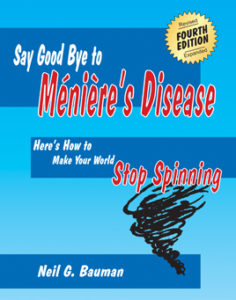by Neil Bauman, Ph.D.
A lady wrote,
I am hearing and my husband is very hard of hearing. When we are together and my husband doesn’t understand someone, I often pitch in and repeat or rephrase what the other person is saying. I would love to have some guidelines for doing this in a respectful and effective way.
When you are married to a hard of hearing person, it’s so easy to become the other person’s ears (and thereby become his slave in that sense). This is not good for your hard of hearing spouse. It’s not good for you. And it’s definitely not good for your marriage.
Each hard of hearing people needs to take responsibility for himself and for advocating for his own hearing needs. Therefore, it is best if you stay out of it unless he asks you for help.
For example, if someone says something to me and I can’t get it, and I know because of the situation I’ll never get it and need help, I’ll look at my wife Diane. This is her cue that I need help and that I want her to “translate” for me.
However, in a different situation where I think I can get it myself, I look at the person talking to me (and not at Diane—which is her default cue to let me handle it) and tell that person what I need them to do so I can get the message.
One place that you can “jump in” and help without him specifically asking you for help is in situations when someone talks to him from behind (or out of his line of sight) where he isn’t even aware of anyone talking to him. In such cases, the “proper” way to help is to get his attention and tell him that someone behind him is talking to him and maybe point so he knows who it was. At that point, it is up to him to tell that person he didn’t hear them and ask them to repeat what they said. then, if he finds he needs your help, he should look to you as per above as your cue to jump in and help.
Unfortunately, too often, the helpful, hearing spouse jumps in and takes over communicating for the hard of hearing spouse (not to take control, but to make it easier on the hard of hearing spouse) without his asking for help. This is not good. The result is he withdraws and is detached from the situation (and probably now doesn’t have a clue what is going on). It is now your conversation, not his. When this happens, he never becomes good at advocating for himself.
The real question is, “How do you know in which situations he typically wants help, and in which situations he typically wants to handle the communications himself? A good way to find out is to discuss ahead of time how to handle various situations.
For example, if I go to a fast-food place alone, I order for myself without much trouble—even without my hearing aids on—I’m speechreading of course—yet if Diane and I go together, I normally tell her ahead of time what I want and let her order for both of us. This just expedites things and it is our choice.
You see, I can’t hear what she orders and if the clerk asks a question, I don’t know whether it relates to her part of the order or mine. Essentially, I am lost. This doesn’t happen when I’m alone, I know everything has to relate to my order.
Here’s another good reason not to jump in uninvited. For many people, lack of independence and low self-esteem go hand in hand. Thus, the more you let someone to do things for you, instead of you doing them for yourself, typically the more your self-esteem drops.
Therefore, in order to increase your self- esteem, you need to take charge and do everything for yourself that you can. Only ask for help if you really need it.
This means that it may take you longer than normal to do certain things (or understand a given communication), but that’s ok. It’s no big deal. Overcoming the challenge improves self-esteem.
One exception to this is during an emergency. In an emergency, a hearing person may have to take charge and suddenly yank you out of danger if there is not time to tell you and get you to understand the emergency situation. I’d rather be unceremoniously yanked away, than get maimed or killed while someone is patiently trying to explain to me that there is an emergency and I need to get out of there now!



What should you do if the hearing spouse has an emergency, such as passing out, and the hearing impaired spouse does not know? Is it a good idea to get a dog and train him/her to go get the other person in an emergency situation?
Hi Trish:
There is no easy answer. If you are the hard of hearing person and your spouse is hearing and he suddenly passes out, you’d not know if he wasn’t in the room with you. But by the same token, if the tables were reversed and you passed out, how would he know unless you were in the same room. Hearing may have nothing to do with it. Now, if you fell down with a thud, hearing could be a factor, but you can’t always count on it.
Having a dog can be a good idea, but this only works if he is trained and the dog is ALWAYS with your spouse. And you should also then have another dog that is trained and is ALWAYS with you if you want to cover both bases.
In reality, with one dog, he may be with you or outside or elsewhere in the house when you really need him to alert you to a problem with your husband. So the chances of a dog working out is not all that great.
A better solution if you have a sick husband is to have a button for him to press to alert you. You could be wearing a corresponding vibrating pager that would alert you that he needs you. Of course, this only works if he can press the button before he passes out.
One such alerting system is the Central Alert system with vibrating pager and SOS button. You can see it on our website at http://hearinglosshelp.com/shop/centralalert-ca-360-alerting-system/.
Cordially,
Neil